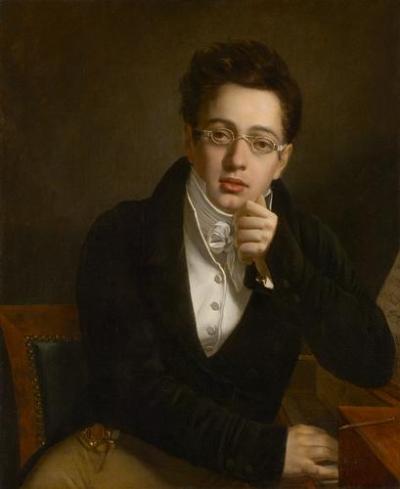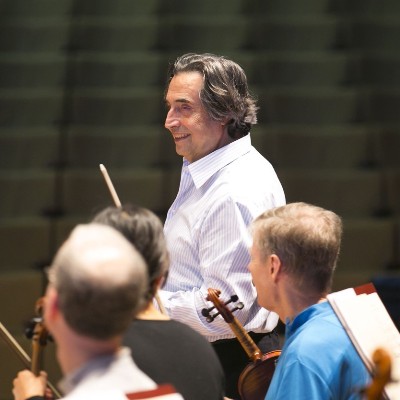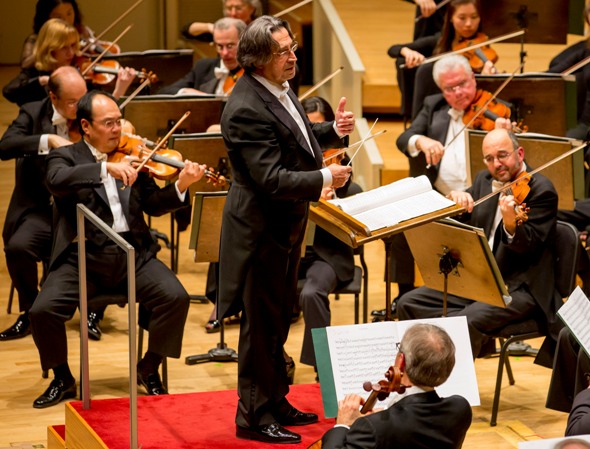Leading CSO toward finale of Schubert cycle, Muti imparts mastery of Viennese tradition
Interview: As Riccardo Muti winds up fourth season as Chicago Symphony music director, he points to finesse of Schubert symphony performances, concluding June 12-17 and June 19-21 at Orchestra Hall.
By Lawrence B. Johnson
Conductor Riccardo Muti’s final two weeks of the season with the Chicago Symphony Orchestra also bring the consummation of his season-long cycle of Schubert’s symphonies. From his perspective “in the middle of the river,” as Muti puts the ongoing project, the CSO is absorbing the style and finesse of his reference ensemble: the Vienna Philharmonic.
 Now in his fourth season as the Chicago Symphony’s music director, Muti has appeared annually as guest conductor of the Vienna Philharmonic for more than four decades. He has recorded the complete Schubert symphonies with Vienna. And in that orchestra, which places Schubert on a god-like pedestal, Muti says he long ago found the authentic Viennese legacy.
Now in his fourth season as the Chicago Symphony’s music director, Muti has appeared annually as guest conductor of the Vienna Philharmonic for more than four decades. He has recorded the complete Schubert symphonies with Vienna. And in that orchestra, which places Schubert on a god-like pedestal, Muti says he long ago found the authentic Viennese legacy.
“I have learned a certain sound from the Vienna Philharmonic – especially in the 1970s and ‘80s, when it was still connected to the old school,” he says. “It is a velvet sound, a way of phrasing, a way of using pizzicato. It is a round sound, full, but not overly Romantic – not Brahms overplayed with a huge vibrato that becomes ridiculous.
“The fact that the musicians of the Vienna Philharmonic also play opera (at the Vienna State Opera) is very important, especially to Schubert, because they understand how to play a singing line. And they understand what it is to play a true pianissimo. Orchestras that can play pianissimo almost don’t exist any more. Today, conductors come out and jump on the podium. Conducting has become a visual art.”
 At the drop of a baton, Muti will name what are in his view the three greatest orchestras in the world: Vienna, Chicago, the Berlin Philharmonic. As much as anything, he says, it is Chicago’s tradition of opera at Orchestra Hall, going back to Sir George Solti and Daniel Barenboim, that has raised this orchestra into the first circle.
At the drop of a baton, Muti will name what are in his view the three greatest orchestras in the world: Vienna, Chicago, the Berlin Philharmonic. As much as anything, he says, it is Chicago’s tradition of opera at Orchestra Hall, going back to Sir George Solti and Daniel Barenboim, that has raised this orchestra into the first circle.
“The CSO played a lot of Wagner in the past, and now it is learning to play Verdi,” says Muti, whose mentoring has immersed the CSO in “Otello” and “Macbeth” as well as the Verdi Requiem. “This orchestra can play fantastic Wagner, and now it can play fantastic Verdi, which has to be played with a certain light – luminosità. It has a flexibility even more remarkable than before.”
High praise for an orchestra that, unlike the Vienna Philharmonic, did not receive the tradition from the hands of its progenitors.
This conditioned buoyancy, agility and thoroughgoing finesse are essential to Schubert as a scion of the Neapolitan tradition, says Muti, noting that Schubert was a pupil of Antonio Salieri, who imparted his own lyrical sensibility to the fledgling composer.
 “People sometimes don’t realize how important was the presence of the Neapolitan school across Europe, with Cimarosa in St. Petersburg, Cherubini in Paris, Spontini in Berlin and Salieri in Vienna,” says Muti, himself a proud son of Naples.
“People sometimes don’t realize how important was the presence of the Neapolitan school across Europe, with Cimarosa in St. Petersburg, Cherubini in Paris, Spontini in Berlin and Salieri in Vienna,” says Muti, himself a proud son of Naples.
The CSO, he adds, is making that pervasive Italian connection, and it is showing in this season’s Schubert cycle.
“The symphonies are like vocal music,” Muti says, citing the “Unfinished” Symphony, performed earlier his spring, as exemplary. “There is a certain melancholy in Schubert that is also part of a Mediterranean melancholy. The B minor (‘Unfinished’) is overplayed but also misunderstood, like a folksong – the opposite of what it should be.
“It is so intimate, nostalgic, like a dream, this expression of longing. It must begin very softly, from very far away, without energy. Schubert was already a sick man, near the end of his life. This symphony is like a good-bye to life.”
 But the symphonies remaining – a pairing of Nos. 1 and 6 (June 12-17), then No. 5 as gentle preface to Mahler’s grand First Symphony (June 19-21) – find Schubert in greater vigor.
But the symphonies remaining – a pairing of Nos. 1 and 6 (June 12-17), then No. 5 as gentle preface to Mahler’s grand First Symphony (June 19-21) – find Schubert in greater vigor.
“Schubert’s First is robust, 100 percent under the influence of Salieri,” says Muti. “The Sixth – the Little C major – is very brilliant, full of life and light. The Fifth is charming, direct, uncomplicated.”
Paying his Chicago musicians a high compliment, Muti summed up their evolving Schubert cycle as chamber music.
“Many times I stop conducting, giving them the opportunity to feel that I trust what I have fixed in rehearsal,” he says. “They don’t need a time-beater on their shoulder.”
Related Link:
- Performance location, dates and times: Details at CSO.org
Tags: Antonio Salieri, Cherubini, Chicago Symphony Orchestra, Cimarosa, Franz Schubert, Riccardo Muti, Spontini, Vienna Philharmonic



Last night’s performance of Schubert and Mozart was incredible with the orchestra and Maestro Muti dancing together through the works. What a pleasure.
Last night’s performance of Schubert and Mozart was incredible with the orchestra and Maestro Muti dancing together through the works. What a pleasure.